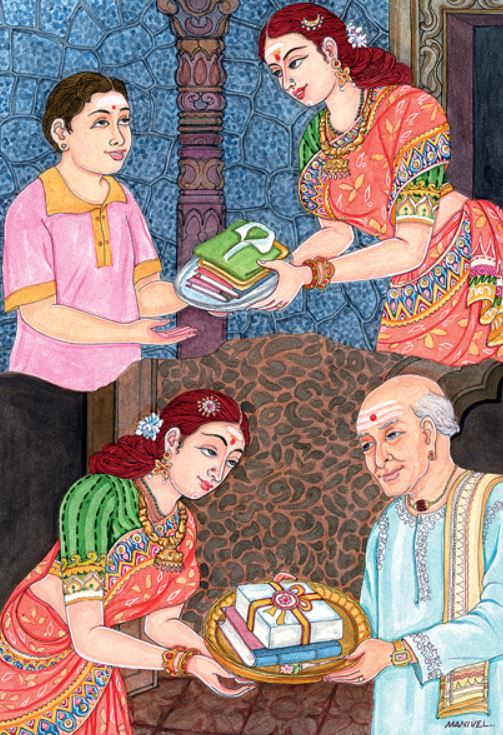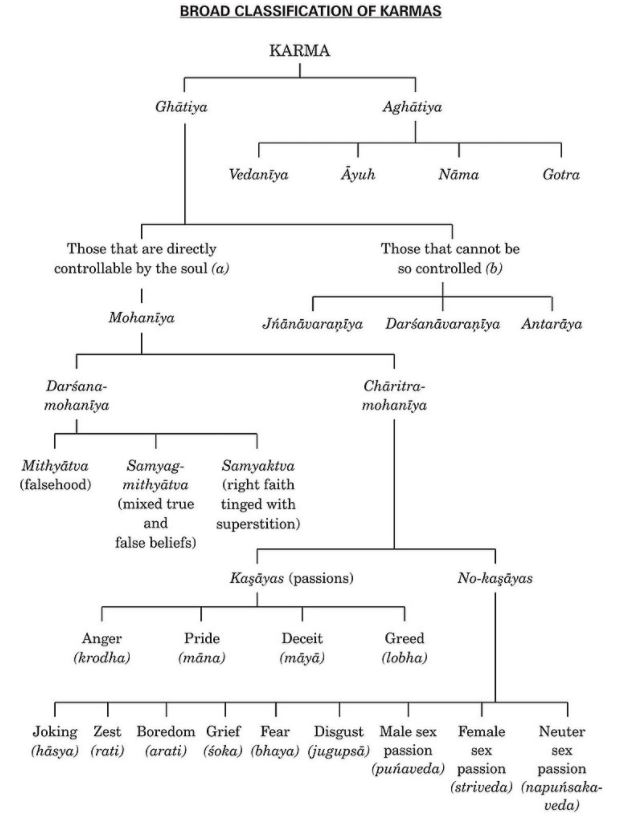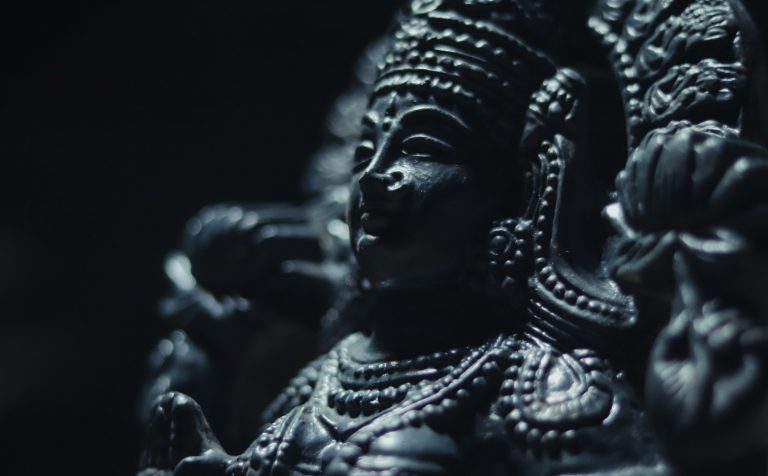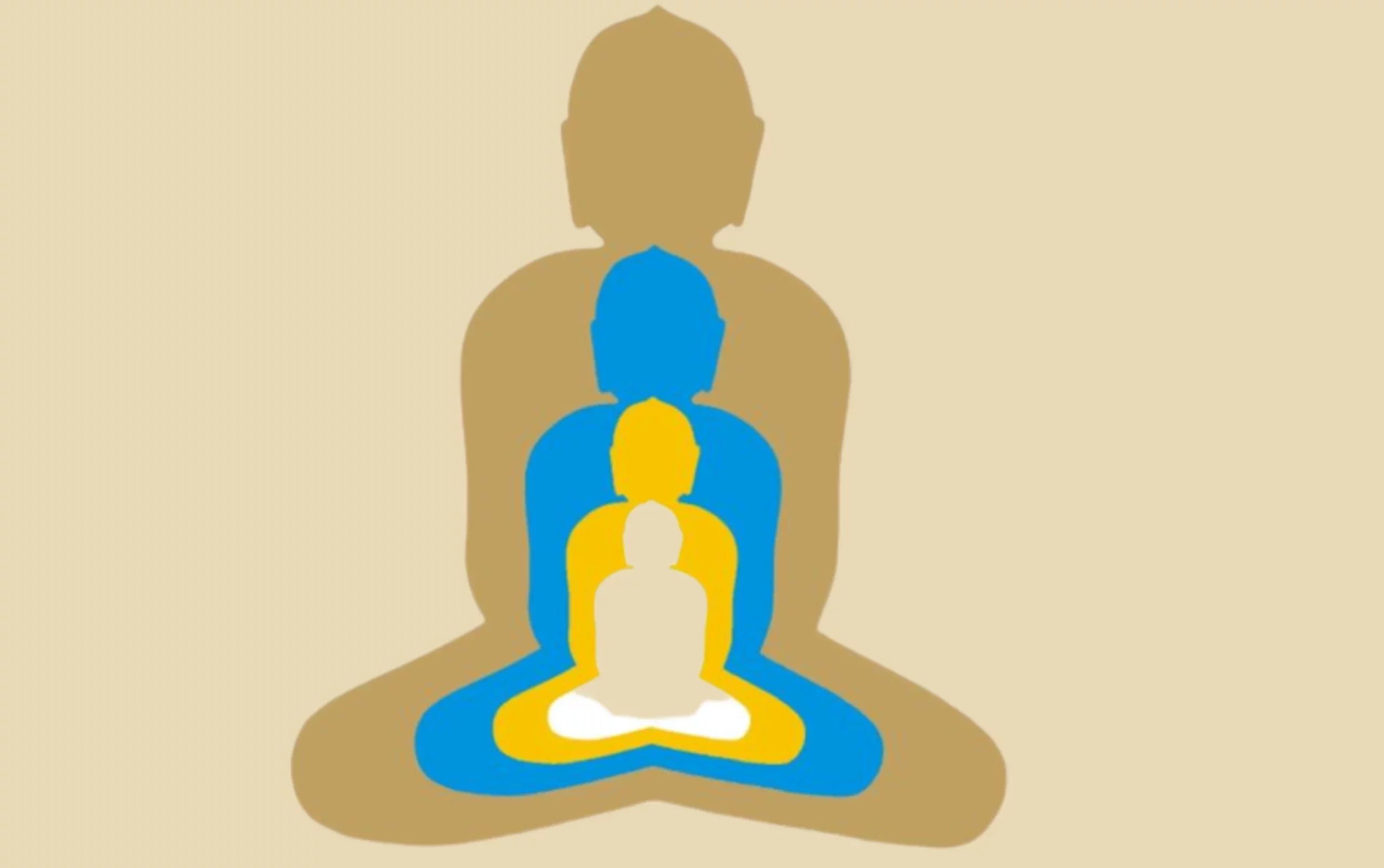The greatest teacher of all time, deliverer of justice, upholder of virtue, and the cosmic law of the Universe, Karma forms the heart and soul of Hinduism, the fundamental reason for the way of life. The greatest reminder to remain pure of heart and remain on the path of righteousness, Karma acts as the Judge, Jury, and Executioner – treating one and all with fairness when it comes to delivering justice. The ultimate theory of cause and effect, Karma reminds devotees far and wide- What goes around comes back around, you reap what you sow and you get what you give.

(Public Domain)
What is Karma?
Karma is one of the most significant aspects of Hinduism and is the consequence or result of one’s actions. It is a universal form of energy that each human puts out into the world- a form of energy that returns to said human in the same way it was sent out. A cosmic tally of sorts, Karma is a reward for good deeds and a penalty for bad.
In its essence, Karma is a theory of punishment and reward – forcing one to be responsible for their life and their actions. It is also closely intertwined with the ideology of Dharma – the rightful or dutiful way of life. The better one’s Karma, the better their Dharma.
Not only is Karma the universal principle of cause and effect, but it is also a force that stretches across multiple lifetimes and universes- accompanying you no matter who or what you are reincarnated as.
Karma is widely revered as the ‘Ultimate Justice’, as it leaves no stone unturned – no good deed goes without reward and no bad deed goes without punishment. It forces one to learn from their mistakes and open their minds to change and improvement, encouraging one to develop into a better person.
The greatest teacher of the Universe, even the harshest form of Karma sparks wisdom and spiritual growth within the receiver. Karma inspires devotees to refine their behavior, seek enlightenment and pursue self-growth and actualization.

Origin of the word Karma
The word Karma was first mentioned in the ancient Vedic texts (1000-700BCE) and is derived from the Sanskrit word ‘Karman’ which translates to “act” or “action”. The very first mention of the word Karma did not have the same meaning as it does today, but rather simply referred to ritual sacrifice.
However, over the years, Karma underwent an evolution and soon began to be known as a “ritual action” that functioned under cosmic law and was uninfluenced by the Gods.
Soon, Karma expanded into the Upanishads (The branch of the Vedas concerned with the study of the philosophical state of being) and was described as the ultimate law of virtue :
“A man turns into something good by good action and something bad by bad action.”
Consequently, Karma began to be revered or followed as the “Casual Law of the Universe”, unaffected by the actions of any divine force or deity. It operates autonomously and poses the best explanation for why evil exists in the world.
Dharma vs Karma
Since Dharma and Karma are closely intertwined and often form a symbiotic relationship, they are often confused with each other, with a large number of people believing that they are the same. However, Dharma is a consequence of Karma and not Karma itself.
It is believed that Dharma is the right way to live the life that is decided for oneself – to perform the role of the life one has been given dutifully and righteously. However, the type of life one is born into – the type of Dharma – is decided by Karma.
Good Karma = Good Dharma
While Karma can be determined by the actions committed by oneself, Dharma is predestined and cannot be changed or avoided. Devotees strive to maintain good Karma in their lives so that when they are reincarnated in the Birth Cycle, they are born with good Dharma – a comfortable and happy life.
Similarly, one who has collected Bad Karma is often born into Bad Dharma – a life that is unprivileged and worse than their previous lives.
Karma in Hinduism
The essence of Hinduism, Karma plays a significant role in the construction of values, rituals, and traditions. In Hinduism, life is considered to be “Circular” or “Cyclic” in nature, as all forms of nature, life, and the universe follow a regenerative cycle. Hence, Karma plays into the cyclic nature of Hinduism by being a law of cycles in itself – “What goes around, comes back around”.
Karma is considered to be the ultimate and most just law in Hinduism. Just like gravity, Karma discriminates against no man, woman, or animal, treating everyone as the same. Karma delivers justice in the world by forcing every person to take responsibility for their actions – life is dictated by the Karma one gains. To maintain Good Karma, devotees pursue a life on the path of righteousness, hence, giving birth to Dharma.
Similar to how gravity is the law of matter, Karma is considered to be the law of the spirit and the mind. It is believed that Brahman (The ultimate source of life and originator of the Universe) gave birth to Karma to act as an autonomous, self-governing, divine law of justice. Unwaveringly fair and just, it immediately creates the appropriate result for the present action.
Although Karma is widely considered to be independent of external forces, some devotees believe that the Gods can manipulate Karma in favor of those close to him. In the Bhagavad Gita (the most sacred Hindu scriptures), It is said that only Karma with a sense of ‘doership’ will yield any results. The type of Karma that is performed due to a sense of duty and without the fear of the consequences does not cause any reaction and will bring one closer to God.
Karma in Buddhism
Karma, also known as Karmaphala, is defined as an action driven by intention which leads to consequences in the future time. These intentions are said to determine the quality of life during rebirth or reincarnation.
Samsara or the birth, death, and rebirth cycle is a fundamental aspect of Buddhism and it is determined by Karma.
Karma in Hinduism vs Buddhism
The major difference between Hinduism and Buddhism in their belief in Karma is that while Hinduism considers Karma to be the “consequence” or “reward” for an action, In Buddhism, Karma is the “intention” of an action – ethical or unethical.
Karma in Jainism
The concept of Karma in Jainism varies significantly from its Buddhist and Hindu counterparts. In Jainism, Karma consists of “Karmic Dirt”, divine particles that pervade all matter in the universe.

(Public Domain)
Karma is hence attracted to the type of Karmic dirt around one’s soul by the aura of the soul created by its thoughts, intentions, and actions. Hence, in Jain’s philosophy, Karma is the matter that surrounds the consciousness of a soul.
Types of Karma
In Hinduism, three main types of Karma govern the universe. These three types or forms are known as Sanchita Karma, Prarabdha Karma, and Kriyamana Karma.
Sanchita Karma
Sanchita Karma or ‘Total Karma’ is the sum of all past actions or karma. It is the result of the actions of a person throughout all their lives and their future lives.
Prarabdha Karma
An offshoot of the Sanchita Karma, Prarabdha Karma is the Karma that is ready to be experienced by the present body and not previous or future incarnations. It is the portion of the Sanchita Karma that affects the present body and cannot be changed or avoided.
Prarabdha Karma is selectively chosen from the mass of Sanchita Karma according to what is best suited for the present body. Closely intertwined with fate or destiny, Prarabdha Karma determines the quality of life, events, family, occupation, and other aspects of the present body.
Kriyamana Karma
Kriyamana Karma or Present Karma is the Karma that is being created by a person during their current life. Kriyamana Karma is the result of the actions committed by the present body and will bear fruit or take effect in the future.
Laws of Karma
It is believed that the divine law of Karma is governed or determined by 10 sub-laws. To maintain and achieve good Karma during your lifetime, it is important to live life per these 10 laws.
- The Great Law
The most commonly known law of Karma – is the law of cause and effect. The great law simply states that good deeds shall be rewarded and bad deeds shall be punished. In its simplest form, you reap what you sow.
- The Law of Creation
According to the law of creation, one can achieve good Karma by actively using creativity and mind to create something that will be of service to others. Be it music and art, or science and literature, any creation that will be used actively by someone else, any creation that will cause happiness and good energy in the universe will be actively rewarded.
- The Law of Humility
To grow emotionally, spiritually, and financially, the most important step is to accept what you already have. The Law of Humility stresses the importance of making peace with your current situation, to attract the energy of the universe that will help you grow and develop. Good Karma comes to those who are righteous and good, but most of all – Humble.
- The Law of Growth
The law of growth simply states that if you want to attract good karma and positive energy from the Universe, it is important to develop or grow emotionally and spiritually within yourself. The Universe is all about expansion and growth, a trait we must inculcate amongst ourselves. Hence, according to the law of growth, to change your life externally, you must first start from within.
- The Law of Responsibility
The law of responsibility stresses the importance of taking responsibility and ownership over your thoughts and actions, regardless of whether they are good or bad. Attracting good Karma from the universe is not possible if you are not aware of your actions and if you don’t claim responsibility for your deeds.
- The Law of Connection
According to the law of connection, all aspects of nature and life in this universe are connected as one whole. All aspects of a person – be it past, present, or future – are connected, just as how all people are connected. The relationships you form, the love you give, and the joy you share with other people and the universe are divine proofs of the connection that is shared between all of life.
To achieve good karma, it is of utmost importance to observe this connection and tune into that energy.
- The Law of Force
The Law of force stresses the importance of directing your energy and focusing on the right task to achieve the results you desire. Focusing on multiple tasks at the same time often limits productivity, whereas directing your complete focus towards one task at a time will allow you to complete or perform the task to the best of your ability.
- The Law of Giving
The Law of Giving is very closely intertwined with the Dharmic way of life and states that to attract good Karma, one must continuously work to give to others- selflessly, compassionately, and with kindness. It also stresses the importance of practicing what you preach – do well when the opportunity presents itself.
- The Law of Here and Now
According to the law of the here and now, it is important to live in the present and appreciate the moments and little joys you have in life. Instead of thinking about the past and replaying mistakes and regretful moments in your mind, observe the world that is currently around you – the people you meet, the food you eat, the music you hear, and so on – and work on bettering yourself for the future.
Living in the present brings about a positive aura or energy in your life that attracts good Karma.
- The Law of Change
If you begin to notice a pattern or a series of unwanted recurring events in your life, the law of change may be showing you a sign to change yourself or your surroundings. According to the law of change, undesirable characteristics may attract undesirable situations and it is important to constantly reinvent yourself.
Unless you learn from these recurring patterns and change accordingly, you will continue to attract undesirable people and situations. It is of supreme importance to understand the consequences of your thoughts and actions and change them accordingly.
Conclusion
The universal law of Karma states that what goes around comes around. By spreading love and kindness, one reaps the rewards tenfold. Conversely, negative actions result in negative consequences. Karma serves as a guiding principle and motivates followers to remain steadfast in the pursuit of righteousness and goodness.





